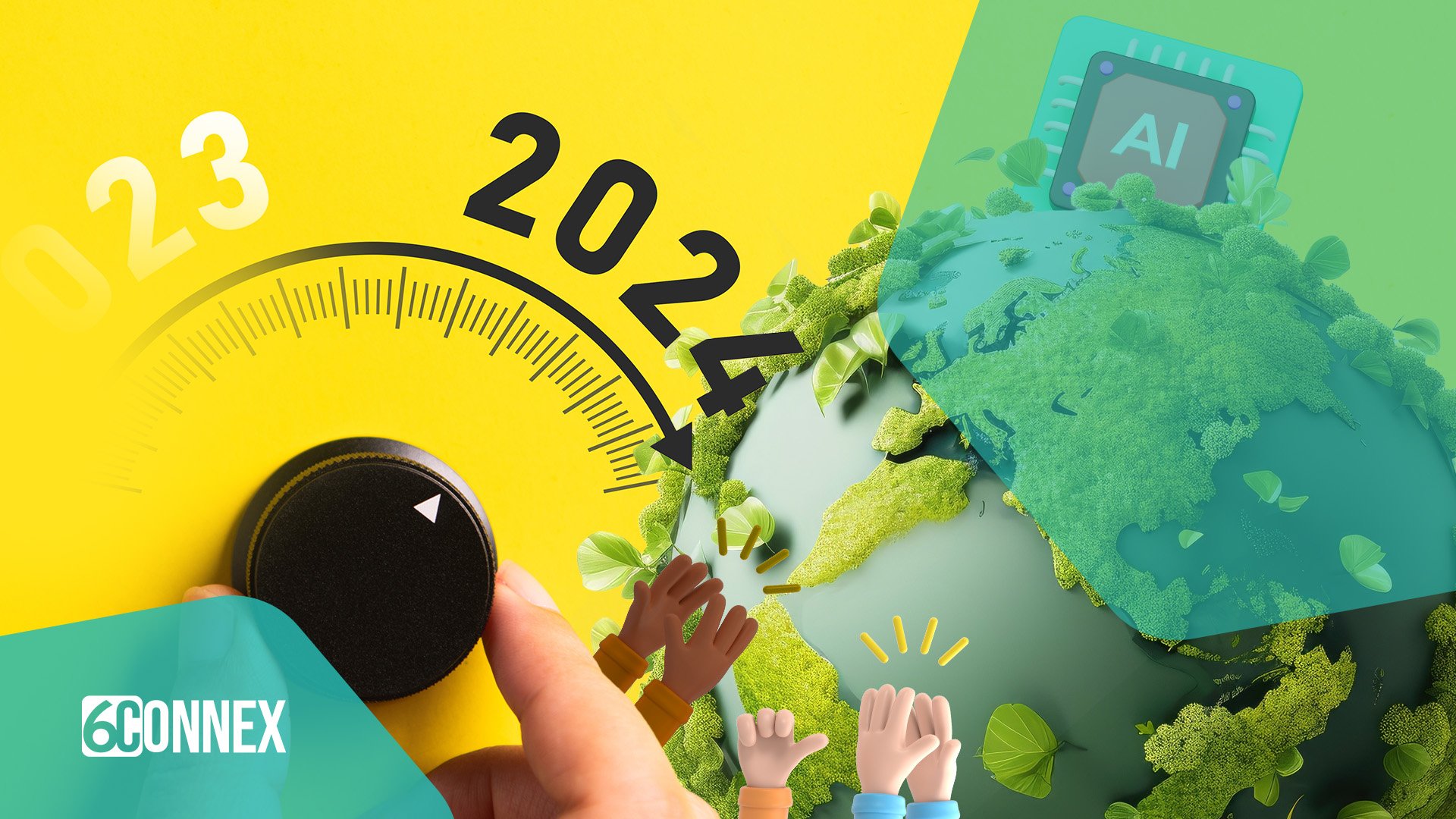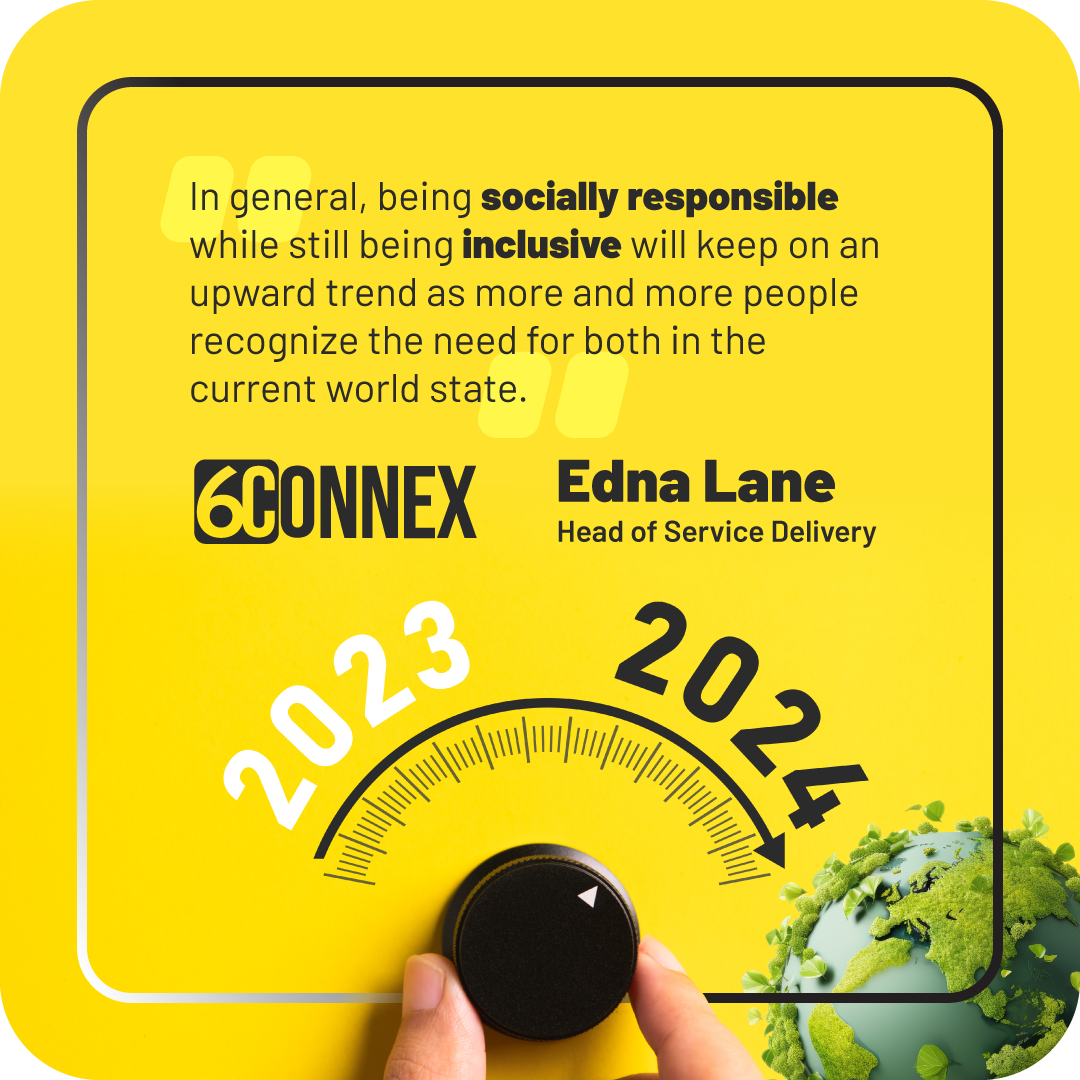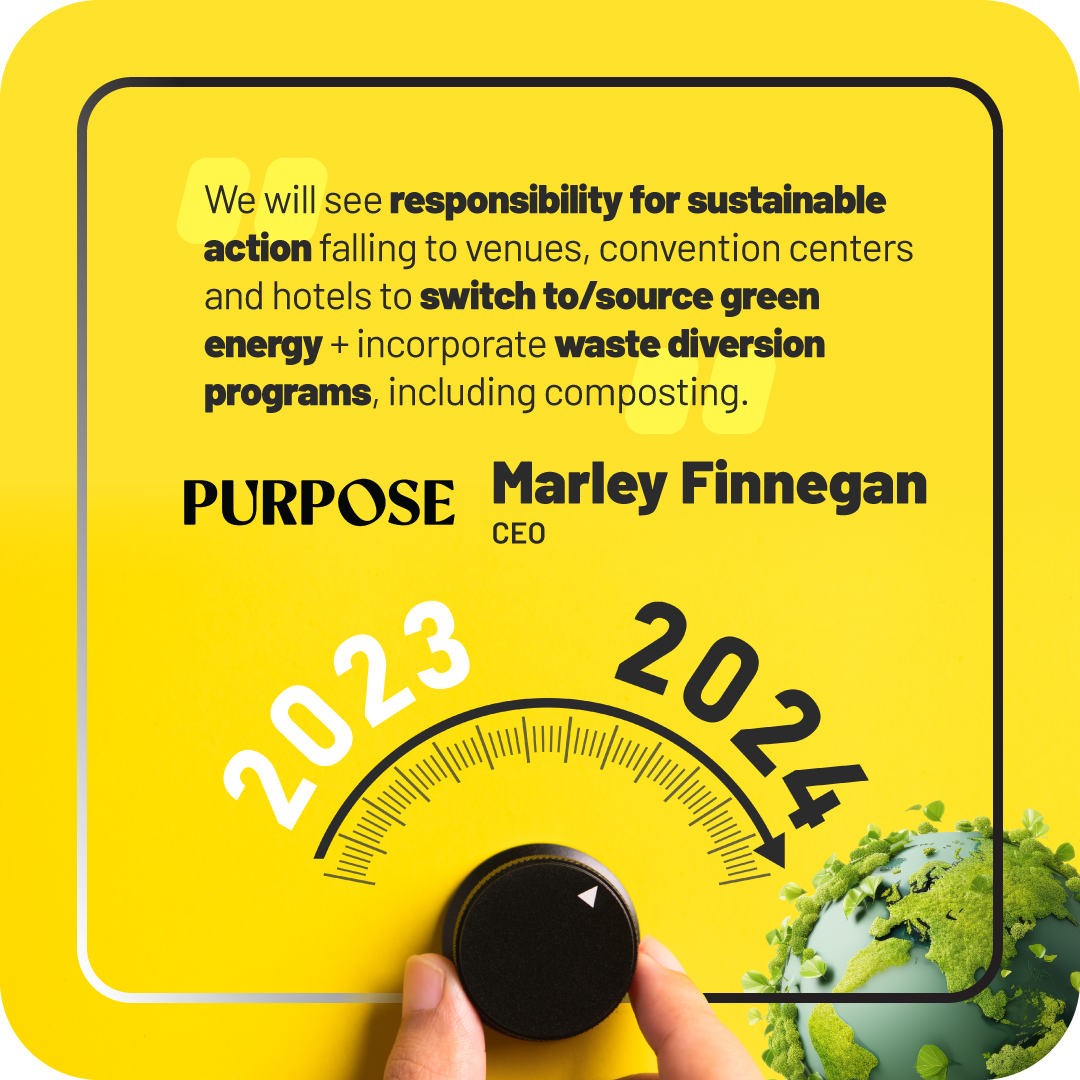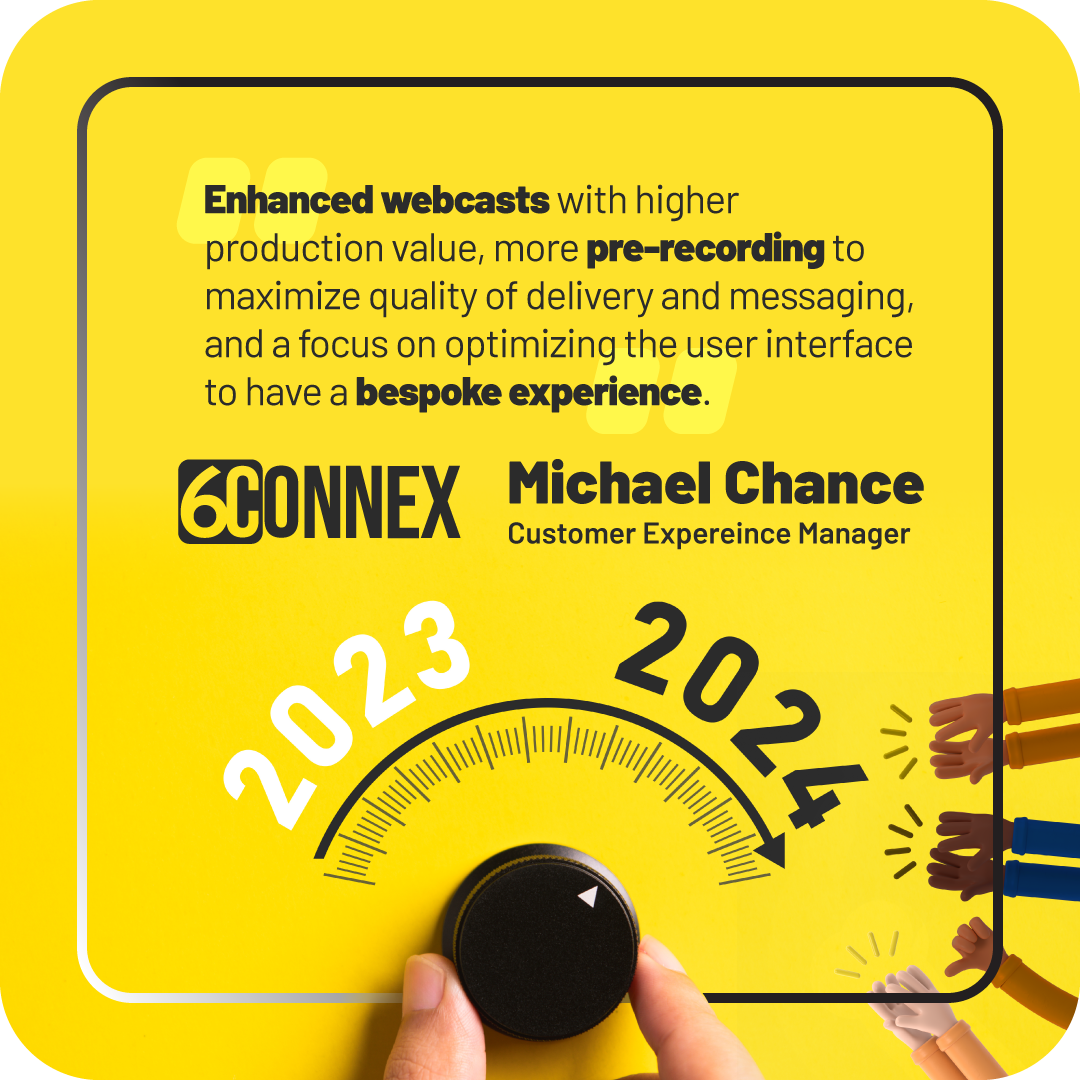4 Emerging Event Trends in 2024
Barbara Kozanecka
Jan 3, 2024 1:56:00 PM

The events industry has almost re-created itself between the pandemic and the conclusion of 2023, recovering from a reported loss of $16.5 billion by March of 2020 to estimated revenue of almost $2.9 billion in 2023. Helped by a renewed interest in travel and unique, interactive tools and technology, audiences experienced some of the most memorable events the industry has ever seen.
But when you’re responsible for creating event experiences that will continue to attract and engage attendees in 2024, it’s not always easy to determine which of the latest trends to take seriously and which ones to leave on the shelf. Fortunately, we’ve asked the experts to weigh in on the industry trends event professionals should consider in 2024 and why.
Here’s what they had to say!
AI emerged in 2023 as a hot trend, and according to Henry Tran, CTO of 6Connex, it will continue to sizzle in the year ahead. “AI will engage the right audience, provide high-value content, generate materials, and automate event organization tasks.”
McKinsey’s 2023 State of AI survey corroborates Henry’s prediction, reporting that sales and marketing were the top beneficiaries of the survey respondents who had integrated AI into business operations. The survey further revealed that in “high AI performing” organizations, the objective of AI use was to increase value offerings and revenue.
Given the uncertain economy, many organizations will place more scrutiny on the expense of event attendance and participation in 2024. According to Tyler Davidson, Vice President and Chief Content Director at Meetings Today, “Organizations will start to focus on the ROI of meetings and events as they formulate longer-range plans and strategies around when and why they are meeting in person.”

To compel companies to include events in their sales and marketing strategies, event planners will have no choice but to tee up a better event experience—and one that generates ROI—for attendees, sponsors, and presenters. To Henry Tran’s point above, this is a lighter “lift,” so to speak, with AI, which can personalize the attendee experience by mining attendee registration and event behavior data to segment groups and plan activities based on demonstrated areas of interest.
Edna Lane, Head of Service Delivery at 6Connex, also agrees with Tran’s take and notes that her favorite events in 2023 were the ones in which clients used AI to increase attendee interactivity and tailor content to attendee preferences. “Having the event more tailored to an individual helps them feel they gained more from attending it.“ Like Tran, Lane believes AI use will increase in 2024, stating, “We'll see more use of AI to make experiences 'pop' while remaining budget-friendly.”
Beyond personalization, it’s essential to note AI technologies can also impact event production. For example, Open AI’s Chat GPT is surprisingly adept at generating event content. A single prompt can yield marketing emails, blog posts, and presentation scripts, easing the workload for all event stakeholders, from marketing teams to keynote speakers.
With vast and still untold benefits to be gleaned from AI, event planners must build a foundation and capabilities to generate value from AI. Summarizes Davidson, “We’re in the beginning stages of a revolution both in business and society regarding AI, so it’s anyone’s guess as to how it will all play out, but everyone needs to be aware of it and realize they need to study its uses and implications.”
Put otherwise by Michael Chui, Partner, McKinsey Global Institute, and co-author of the 2023 State of AI report, “… ‘The rich are getting richer’ when it comes to extracting value from AI,” so the time to invest is now.
Another recurring theme for 2024, cited by our experts, was an increasing focus on sustainability. Marley Finnegan, CEO of PURPOSE, believes that not only will awe see a rise in the number of narratives about sustainability in the events industry in 2024, but with compliance regulations going mainstream for publicly traded companies, we will also witness heightened demand for venues, convention centers, and hotels to adopt sustainable practices such as switching to green energy and incorporating waste diversion programs including composting. Finnegan also predicts attendees’ concerns about the environment will significantly influence event decisions such as menus. Expands Finnegan, “For example, we will see younger generations express increased criticism of beef on menus at events as people begin to further understand the magnitude of beef’s environmental impacts.”

Lane agrees with Finnegan and notes that a more significant, collective sense of social responsibility will continue to grow. “…sustainability and finding ways to make a smaller footprint on the world will be as vital as ever, especially when it comes to hybrid events.” Lane also suggests that sustainability and inclusivity pair well, pointing out that as events take a hybrid or virtual format to reduce carbon footprints, one benefit is increased accessibility. “…in general, being socially responsible while still being inclusive will keep on an upward trend as more and more people recognize the need for both in the current world state.”
Finnegan’s organization, PURPOSE, is a great place to start if you're wondering how best to lean into the sustainability trend. In 2023, PURPOSE focused on educating agencies, event professionals, and organizations on creating and scaling sustainability practices. The organization has created a Sustainability Strategy Certification course, newly available in January 2024, to share its intellectual property and demystify the “how to” of sustainable event planning.
When it comes to sustainable event practices, Eduardo Lebre, CEO & founder of Circular Unity, an organization dedicated to empowering events, sports, hospitality, tourism, and entertainment organizations with technology to comply with Sustainable Development Goals (SDGs) and the Paris Agreement, agrees with Finnegan and Lane and believes that in 2024 not only will we see an uptick in sustainable mindsets, but also in impact measurement. Lebre states that organizations can demonstrate their commitment to sustainability by capturing and reporting sustainability metrics such as water, energy, heat, fuel, waste, food and beverage consumption, staff and attendee travel, etc., and build a business case for advancing sustainable initiatives. “Once you have the impact measurements for an event, you can socialize them and look for ways to improve.”
When asked to identify their favorite events of 2023, a common theme emerged from our industry experts’ answers: event experience! The events that resonated most with our experts were the ones that served up unique personalized experiences featuring quality content, fun activities, networking, and app-driven engagement opportunities such as virtual photo booths and social media walls.
According to our industry experts, engagement was one—if not the—single biggest driver of event success in 2023, and the trend is likely to continue in 2024, as attendees have been increasingly conditioned to actively participate in event agendas rather than passively listen to presentations. Event planners know they’re competing for attendees’ attention, and the competition is stiff! Consider: Does the keynote speaker stand a chance against the content on Instagram or TikTok without an interactive element?

States Michael Chance, Customer Experience Manager at 6Connex, “Events are no longer just about content. They’re about creating moments. We’ll see event timeframes shortened to maximize message potency and drive increased networking during peak event hours.”
In addition, Chance foresees event planners leaning into event technology to encourage—and track—attendee interactions. “Event planners will deploy creative uses for QR codes to facilitate and measure participation in breakout meetings, polls, and more.”
The hotel industry concurs with Chance’s insights, and hospitality group Accor notes in its latest trends report, “The very definition of an event is being rethought in terms of structure, content, and venue… By creating experiences rather than simply providing meeting rooms, we can help embed ideas, memories, and different ways of thinking.”
Chance stresses that attendee engagement will remain a high priority in virtual events, too. “Event planners will provide enhanced webcasts with higher production value, such as more pre-recording to maximize message and delivery quality and an increased focus on optimizing the user interface to create a bespoke experience.” As cited above, increasing adoption rates of AI will also improve the virtual event experience as planners lean on technology to provide engagement opportunities such as personalized matchmaking and chatbots.
While in-person events enjoyed a significant resurgence in 2023, as event participants were eager to stretch their legs and travel, experts believe the pendulum will swing in the other direction in 2024, and the industry will finally find its middle ground between virtual and in-person formats. States Davidson, “We saw a huge spike in in-person events post-pandemic due to workers really itching to get on the road and meet people. So many organizations wanted to hold meetings that there was limited destination inventory. I think, in 2024, this trend will settle.”
A survey by Forrester of more than 500 global events and meeting strategy planners lends credence to Davidson’s vision. 71% of survey respondents reported that in-person events are vital for increasing engagement with attendees, and more than 50% claimed they are instrumental in improving lead generation and deepening customer relationships. However, 73% also told Forrester that serving virtual event attendees will continue to be a key part of their ongoing in-person event strategies.
Luiz Martins, CMO at 6Connex, agrees with these assessments and highlights the numerous technological innovations that support hybrid events. “In 2024, most events will have in-person and virtual components combined. New tools now available in the market support a versatile event strategy design.”
Martins also notes that there are financial incentives to mixing and matching in-person and virtual event formats. For example, companies can secure high-profile speakers without incurring costs associated with their travel. Likewise, there are no limits to virtual participants, which allows event planners to expand the number of attendees remotely without increasing budgets for things like catering.
Martins predicts that event technology providers with an extensive portfolio of services that create unique in-person and remote event experiences will win in this landscape. He advises event planners to choose an event technology vendor at the forefront of digital advancements, with a robust product roadmap, cutting-edge features, and functionality to quickly create unique, immersive, memorable events for all audiences regardless of attendance format.
As we conclude our review of the trends in store in 2024, one thing becomes clear: events will continue to innovate. From AI to watershed improvements in sustainability, we can count on the industry to evolve. Let’s meet again in 12 months, shall we? You can tell us if we got it right.
6Connex is the leading provider of in-person, hybrid, and virtual event technology for enterprises worldwide. Our cloud-based product portfolio includes event management tools, in-person event apps, virtual venues, webinars, learning management, and more.
From internal meetings to large scale conferences, we allow you to engage and transform big ideas into real-world results.
425 Soledad St.
Suite #500
San Antonio, TX 78205
1.800.395.4702
Australia: +61.2.72294013
Brazil: +55.11.4375.3555
United Kingdom: +44.20.37447284
United States: +1.210.890.5769